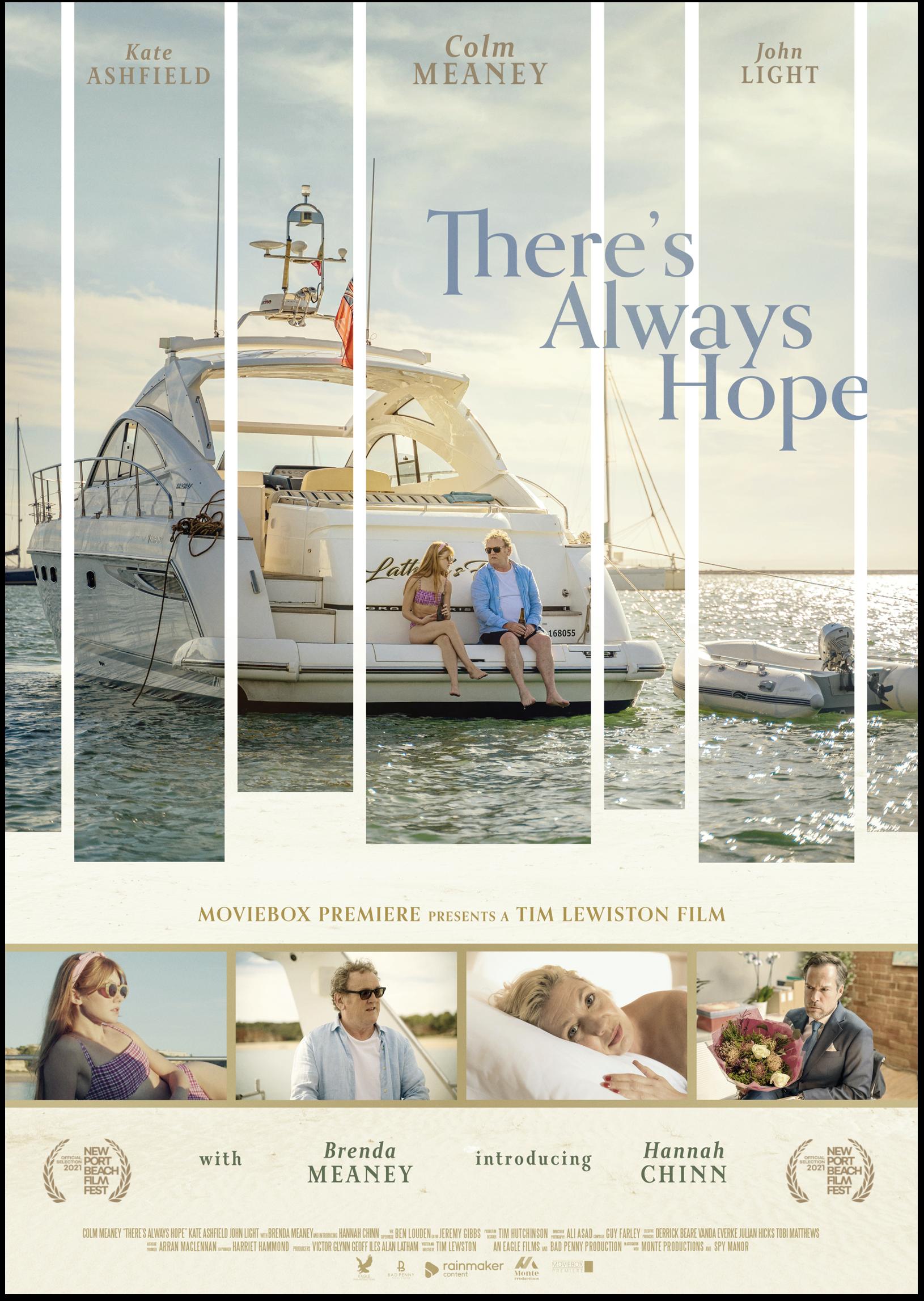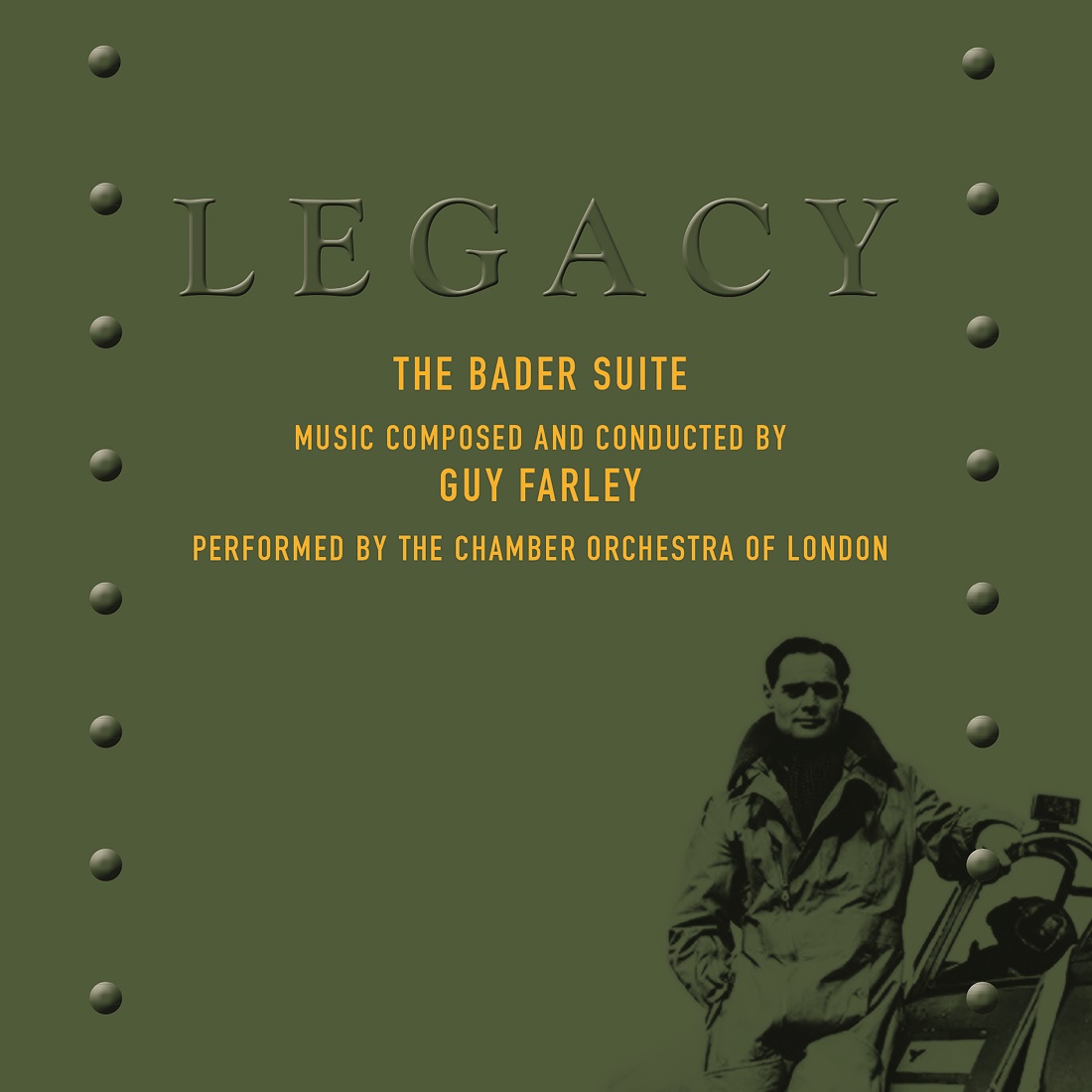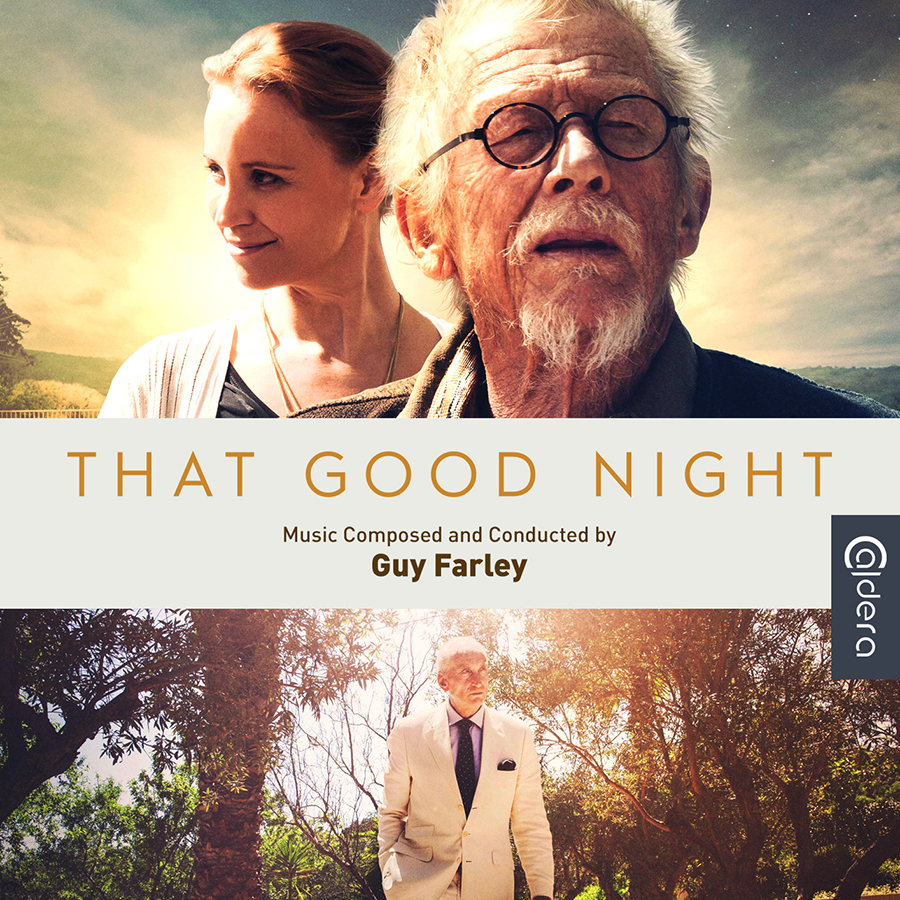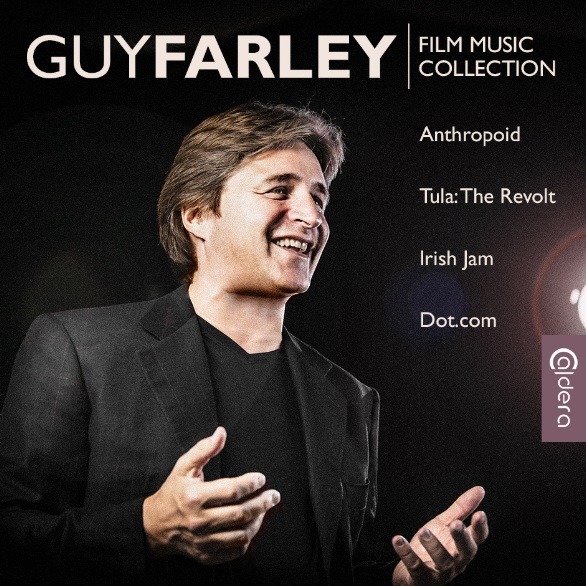|
“Given Freedom, I Can Write Good Music” - Part
2
Interview with Guy Farley conducted on 3rd March 2012 in Sphere
Studios, London
by Stephan Eicke
Q
:
The motion picture “Cashback” is based on a
short-movie…
G.
F.: Yes and the short-movie was
Oscar-nominated. A friend of mine, Rick Astley, wrote the
music for that project. I remember him saying to me “Guy, I am
doing what you are doing!” “Really, Rick?” “Yes, I am writing
the music for a short-movie!”
I thought this was incredibly unusual
when you look at his career. When the short-film turned out to
be immsensely successful and they got the funding to make the
feature, it was Rick who said: “Use Guy! Guy will do this
score! This is his thing!” I will always remember that. I
wouldn’t have done this score without Rick Astley. I used to
ring him up, saying: “Rick, you do realize that most of my
tunes come from your big songs, don’t you (laughs)?” I have a
very amusing relationship with him. Actually, there is a cue
which builds up and which is called “Suzy’s Theme”, composed
for a long montage. I remember writing it in this room and I
literally wrote it in two minutes. It’s not a complex piece of
music. Sean Ellis said to me: “I want this to be the most
devastating break-up. Your whole life falls apart!” I ran the
scene and the music had to reach t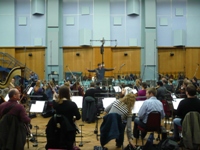 his
point where your heart pours out. It’s funny that I was asked
to write the music for a commercial of “Carling” about five
guys who are stuck in a desert. It is all about the power of
friendship and the producers were wedded to that piece from
“Cashback”; they loved it. They wanted to have the same ending
for their commercial. his
point where your heart pours out. It’s funny that I was asked
to write the music for a commercial of “Carling” about five
guys who are stuck in a desert. It is all about the power of
friendship and the producers were wedded to that piece from
“Cashback”; they loved it. They wanted to have the same ending
for their commercial.
Q
:
I do remember the montage where Suzy can be seen
running through a meadow, accompanied by the lush, orchestral
melody that you described. It worked quite well despite the
fact that these over-the-top romanticisms have become quite
rare in modern film music. Weren’t you afraid that it ended up
sounding like a self-parody?
G. F.: I
have never thought about it like that. I spotted the film with
the director and all he said to me was: “This boy’s life has
fallen apart. It’s the end of his life. I want it to be
enormous. Make it pour the emotion out!” I had no problem with
doing exactly that. At the end of the movie, there is one cue
that I played on a solo-piano. I regret that now. At that
time, I thought I did the main theme with an orchestra and
after that I wanted to work my way down, playing the rest on
piano to simplify things. Sometimes that happens. Sometimes
you want to simplify things. Sometimes you want to have your
theme played on one alto-flute note for note on its own, going
back to the basics because you had everybody else play it. I
think that a lot of this music is a reflection of who I am.
People say to me: “Why do you always have to use so many
strings? Why do you always have to do these big orchestral
sessions?” I never care about the money. I spend it all on an
orchestra. That is how I express myself. I am very happy
expressing myself with a very big sound.
Q
:
You have been very influenced by John Barry, haven’t
you?
G.
F.: There are the
three J’s: John Williams, Jerry Goldsmith, John Barry. I love
the expanse of their music. I love the melodic content of
their music. I love the size of it. Nobody writes music like
that. I once went to the ‘Concert for Care’-event at the Royal
Albert Hall where music by some contemporary film composers
was performed and there was only one piece that I liked. The
rest I just felt embarrassed about. I thought that no one used
the orchestra. No one composed for an orchestra, no one
composed for strings. It sounded like it was all played on a
piano.
Q
:
…and the piece you liked was composed by Christopher
Gunning.
G. F.: And
the best piece was composed by Chris Gunning. I thought that
was worth listening to. None of the rest of it was. I was
almost embarrassed about that actually. But you have to
remember film music is not about music, it is about the film.
As I always say to people: if you come out of a movie, saying
“What a great movie!” and I ask you “What was the music like?”
and you don’t know because you didn’t notice the music but
enjoyed the music, then it was good music.
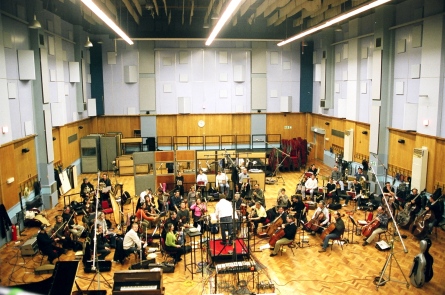 Q
:
You are very proud of your music for “Land of the
Blind”, aren’t you? Q
:
You are very proud of your music for “Land of the
Blind”, aren’t you?
G.
F.: I
loved writing that! I used kazoos and the effect was fantastic
because it was so over the top and so overblown. Listen to the
theme for Maximilian II…
Q
:
…which reminded me of
Morricone.
G.
F.: Morricone is a
unique composer with a unique sound. An amazing composer! I
hope he goes down in history because he deserves to. I am
utterly humbled by Morricone’s music. I can’t go near it. I
may be inspired by it but I can’t get near it because it is
his music and his territory. I admire him enormously. I did an
arrangement of “Gabriel’ Oboe” for a movie called “If I were
you” and I played my arrangement to a friend, who said to me:
“If you had written this tune, I’d have come over to worship
you!” Morricone is a great man but I was more inspired by Nino
Rota on “Land of the Blind”. I really enjoyed that project. I
remember seeing that movie and I came back and wrote my themes
literally that day because I knew straight away what I wanted
to do. It was such a great script with great performances. I
looked at this diminutive character played by Tom Hollander,
this overblown East-European megalomaniac leader. I just
thought he’s going to have the toy-trumpet!
Q
:
The theme sounded like a parody to
me.
G.
F.: It totally is! It
sounds like a spoiled little child and I was able to do many
variations on it.
Q
:
Do you mind getting back to “Cashback”? One of the
themes in “Mother Theresa” became Suzy’s
theme.
G.
F.: Very interesting that you say that because
I never thought about that before. Sometimes you compose
things that are part of you without realizing what it is you
are doing. I remember writing a theme for “Mother Theresa”,
thinking “I can’t believe I wrote this! This is an amazing
theme!” and then I kept thinking “I am sure I had heard it
somewhere else…” It was the second movement of Mozart’s
Clarinet Concerto. It was the whole progression and everything
(laughs)! I was extremely disappointed. In that year, I scored
six movies and composed one score in two weeks. I still think
it’s possible to write good music quickly, provided you have
your thematic material right and provided you hear everything
in your head and you know what you are doing. Where you
struggle is when you force yourself to write something. It’s
sadness when you are against time and lose the freedom to be
creative. I wrote the music for an Italian film called “L’uomo
che sognava con le aquile” and I remember when I was asked to
play some of my ideas on the piano. I hadn’t written anything.
The only thing I knew I liked where the opening chords in the
middle movement of Penderecki’s Third Symphony. I played them
and I said: “This is it!” I built the whole score out of my
first two chords. What I mean is sometimes you can sit down
and write all your themes in one or two days like I did with
“The Hot Potato”. On other projects I sat in my studio and
couldn’t come up with anything. You never know.
Andrew Pearce, who orchestrates
my music, pointed out to me: “Oh, I see there is a whole
progression from ‘Modigliani’ over a scene in ‘Maria’”. He was
absolutely right. It was just something that I always liked
very much because this progression works very well
dramatically. I don’t reall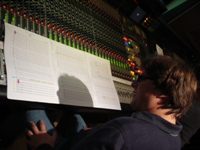 y
like to call it a tool because it is an orchestral motif. As a
film composer, you develop tools that you know work to
picture. Everything you have to know can be found in Richard
Wagner’s “Ring der Nibelungen”. They have done it all before.
All you have to do is study it. y
like to call it a tool because it is an orchestral motif. As a
film composer, you develop tools that you know work to
picture. Everything you have to know can be found in Richard
Wagner’s “Ring der Nibelungen”. They have done it all before.
All you have to do is study it.
Q
:
Tell me something about your musical concept for
“Cashback”: music which is frozen like the people in the
dream-sequences and which is as restless as the main character
at the same time.
G.
F.: Yes, I wrote a theme for the scenes where
he froze time. It is played on the piano and has a lot of
reverb on it. It goes back to the very simple thing of
chord-changes. I loved the first inversion of a minor-chord. I
was very moved by the opening chords which are changing and
which were my starting point for the whole score. Actually, I
thought there is something very French about it because it
reminded me of a piece which can be heard in a movie called
“Diva” from 1981 (plays the theme for “Diva” on the piano).
That gave me the idea for the concept. It’s all about frozen
time. The sound is so light there is a lot of beauty in it. I
played it to picture and it worked very well. So much of what
I do is simply the way I feel when I see the picture. I watch
the movie and I play the piano. I sat here in my studio, wrote
to the picture and that was it. I didn’t change it. “Frozen”,
the theme from “Cashback”, was written in the course of a day:
in a morning or in an afternoon.
On
YouTube, many people have used “Frozen” over personal films
and it is fascinating seeing how other people relate to that
music. When this piece was released on an album, I simply
entitled it “Frozen”. I don’t know why. There is one piece in
“Cashback” where I really froze the music when writing the
string arrangements for the song “Inside” by a band called
Bang Gang. Listen to the size of the strings! The song is very
simple with only a keyboard, a base and a singer and I put 45
strings under it which make the music sound very big. At the
end of the song, I froze the sound of a room full of strings.
Q
:
You also wrote the string arrangement for the song
“She” by Grand Avenue.
G.
F.: Yes, the director liked the song and asked
me to write strings over it. It’s a great song to do string
arrangements over! The director knew where he wanted the song
and I remixed it. I was in touch with the band and they were
absolutely delighted!
There is something that always makes me
laugh about modern pop songs when you do arrangements: they
are 3 minutes long and it’s always the same chord progression.
This simplicity never ceases to fascinate me (laughs). I love
this s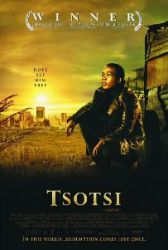 ong though because it works
wonderfully in the movie and it ties the score together. I am
not precious about the work I do. There are composers who say:
“It’s a pop song, I won’t work on it because I only compose
serious music.” I’ll do anything. ong though because it works
wonderfully in the movie and it ties the score together. I am
not precious about the work I do. There are composers who say:
“It’s a pop song, I won’t work on it because I only compose
serious music.” I’ll do anything.
Q
:
That’s what you should do when you work as a film
composer.
G.
F.: And you should be able to do it. You
should be able to cover everything. It is very important to do
everything. I have always liked the fact that I have crossed
barriers and that I can do different
things.
Q
:
I didn’t really understand the story why your music
was rejected on “Tsotsi”.
G. F.: Basically it is a very
simple story. “Tsotsi” had a very good and strong director and
very controlling producers. What happened is that they made
this very good movie. My music publisher called me up and
said: “The producer wants to see you. He had always wanted you
to work for him but the director wanted to use his own
composers.” I went to see the film with the music by these
composers and I thought the film was brilliant. I said to the
producer: “Why am I here?” “I think the music could be
better!” “I have to tell you that you made an amazing movie
and I didn’t have any problems with the music at all. In fact,
this movie is not about the music. It is about the
characters.” “Yes, but I think with your expertise we can
really make so much more out of it.” I remember saying to him:
“It will be a mistake to challenge the integrity of the film
by trying to write a strong thematic score. Don’t look at this
as a ‘Chariots of Fire’ or ‘Out of Africa’.” He wouldn’t let
me go. It was between me and Trevor Rabin, who is
South-African. Trevor wrote some ideas and I wrote some ideas.
It was offered to both of us. I have never heard Trevor
Rabin’s ideas. The director met with me and said: “I like this
theme that you had written and I want you to rescore that
movie. However, the director doesn’t agree, so he is not going
to be involved with it but we have complete control over the
film.” I remember saying to him that this is a very unusual
situation because I should work with the director. First of
all, I admire the director for making a great film. Secondly,
he stuck by his composers. He didn’t necessarily agree with
the producers who took out some music and who did a lot of
messing around with the film that he gave in to, but he never
wanted to lose the music his composers had done and who had
worked for six months on that score.
However, the producer was very
strong-willed and wanted me to re-score the movie. I never
felt comfortable about it because I did everything without the
director. I recorded the music in ethnic sessions, orchestral
sessions, vocal sessions, attended screenings without the
director having heard anything. All hell let lose when the
producers went off to South Africa to lay my master on the
film with the approval of all their fellow producers. The film
had been entered for film-festivals with a new score without
the approval of the director. When the producers got off to
South Africa, the director had a complete fit. He said: “You
are not touching my movie! I am not having the music changed!
I don’t agree with that!” I remember the producer saying that
this is the worst experience of his life because they were in
a complete battle. An emergency meeting was held. They reached
a conclusion and told me: “We are going to hold two screenings
with test audiences. We are going to run the movie with the
score that is on it and we are going to run the movie with
your music.” The dir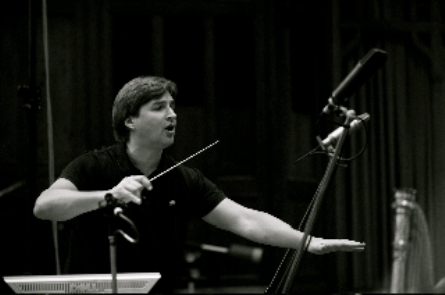 ector hadn’t heard
anything of my music but he agreed with the screenings.
However, they couldn’t get the screening organized. The film
went to the Edinburgh Film Festival and won a prize with the
original score on it. The director said: “I am not going to
change anything! That’s it!” ector hadn’t heard
anything of my music but he agreed with the screenings.
However, they couldn’t get the screening organized. The film
went to the Edinburgh Film Festival and won a prize with the
original score on it. The director said: “I am not going to
change anything! That’s it!”
Q
:
A very understandable point of
view…
G.
F.
: Absolutely! I totally understand the
director’s point of view! It ended up being a very sour
experience for me though and looking back on “Tsotsi”, I
should have said to the producers I will only do this with the
support of the director. Scoring a movie without the input of
the director is very odd and it’s not right. The producers
were very overbearing and said they had the complete control
and the final say. From a distance, Gavin Hood (the director)
was very territorial over the film and very protective of his
composers. Composers work for directors. We shouldn’t work for
producers. They are an important part of the equation but
that’s it. It was an unpleasant experience because my team put
a lot of work into the film only to discover that there were
all sorts of political discussions behind the scenes that I
didn’t know about. It all exploded. Actually, the director
rang up my agent and said: “You have no right to mention Guy
Farley in relation to my film. His music is not on my film and
he has nothing to do with my film.”
I
realized how territorial he was but he was the director after
all. I enjoyed scoring it but I was aware of the fact that the
music could only take a second place. It had to serve the
film. I couldn’t compose “Chariots of Fire” or “Out of
Africa”, which was the idea that had been talked about. A lot
of it is very subtle and very soft.
Q
:
I haven’t watched the movie yet but the plot about the
baby who teaches the killer the most important things about
life and love sounds a bit schmaltzy. Did they want you to
intensify this emotional, kitschy center of the film?
G. F.: Possibly you could
look at it this way, yes. It’s an interesting conversation: If
this killer had not been born where he was born, if he had
been brought up by a loving family, would he have done the
same? What is really inside this boy? In fact, this boy is a
child who really wants love and who is now faced with this
baby that needs love as well. He takes the baby to a woman who
can breastfeed and clean the baby which she does at
knifepoint. Behind the horror of what the boy was capable of
doing and what he did, you see inside the boy. I wanted the
music to reflect the absolute purity of the baby. There is
goodness in the mother, goodness in the baby and even goodness
in the boy who was probably never loved. That was the most
important thing to me. We can all show horrific aggression but
isn’t it far more interesting to get inside and to understand
the characters? For some scenes, I wrote the softest music I
had ever written. It was all about total purity, good and
evil, right and wrong, absolute beauty and absolute horror
side by side.
Q
:
You have worked on a number of Italian movies during
the last years.
G.
F.: That came about “Mother Theresa”. It’s a
funny thing when you look at Morricone’s output and the amount
of music he has written for Italian television. It’s vast! I
was offered “Mother Theresa” because the producers couldn’t
find a composer who was able to write Indian music and
traditional orchestral music. Somebody over here suggested me
because I had done the score for a television series for
National Geographic called “India Diaries” where I had worked
with Indian musicians.
Indian music is a specialty that you have
to understand. In a simple way, I was able to use Indian music
in a western score where it still sounded Indian. When the
Indian players turned up, I had written all their instrumental
parts out. No one of them could read any notes. In Indian
music, everything is passed down by ear. You are taught to
become a composer. Every Indian is a composer. All the works
that they composed are all passed and changed. The film and
the score did very well and I started being contacted by
Italian producers. They are stressful jobs because it means a
lot of music in very little time. But they do respect
composers. They are traditional. They like melodies and
orchestral writing. Over here, nobody wants melodies.
Everybody wants so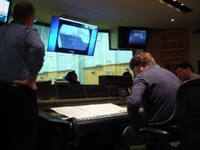 und-design. The Italians
spend money on their scores. They appreciate you as a composer
and they let you compose. They call you “Maestro”. It is
totally different from what I see in Los Angeles and in the
UK. The rest is no big difference. I still sit here, scoring
to the picture with a translated script. und-design. The Italians
spend money on their scores. They appreciate you as a composer
and they let you compose. They call you “Maestro”. It is
totally different from what I see in Los Angeles and in the
UK. The rest is no big difference. I still sit here, scoring
to the picture with a translated script.
Q
:
You mentioned how composers are treated in Hollywood.
Did you ever have the ambition to make a career
there?
G.
F.: Here is the big
question how Hollywood fits into my life. I’m very English. I
love this country and there is so much about it that I am
happy with. I go to Los Angeles from time to time and I worked
in Los Angeles but I always had the plan to become a film
composer here in England and that I would get on a film that
would break me as a composer and that I’d be invited to Los
Angeles where I’d be given a big film to score. That hasn’t
happened yet. You then have this conversation with other
people what you are leaving when you get out to Los Angeles.
Do you want to be one of 2000 composers out of work? Why give
up what you have in the UK where you are constantly in work? I
do work for people in Los Angeles but I haven’t come to the
decision to leave this country. I stayed here because I always
had enough work. Even when I was scoring “The Flock”, the
producers said they wanted me in Los Angeles but I didn’t want
to leave my room here in London. It was a big thing for me to
get up and go. I wrote the score out there, I lived out there,
I hired my equipment out there and in the end it was fine. By
the end of it, I thought it was not a big deal. It was easy.
It’s like in South Africa: the sun is beautiful, the palm
trees are lovely, the sky is beautiful. It’s totally different
from England and totally different from Germany. I thought to
myself: “Could I get up and live here?” The truth is I could.
It is a huge decision and I simply hope that something will
happen. I also know composers in Los Angeles who only work in
England. That’s very odd. A friend of mine, Rolfe Kent, went
to Los Angeles a long time ago and it took him ten years to
become established. He told me that he had a period of two
years where he didn’t have a single job! I was moaning about
the fact that I had only done seven films. He said to me: “You
have done more in three years than I have done in ten years!”
It changed for him though. Very suddenly, he moved up. He left
this country, he went there and he did it. I admire him for
doing it.
Q
:
Swedish record producer Mikael Carlsson released quite
a few of your scores on CD. He really loves your work, doesn’t
he?
G.
F.: I
have had nine soundtracks of mine released which I think is
pretty amazing. I have had them released by different labels
and probably more by MovieScoreMedia than any of the others.
My agent kept ringing me up and said: “There is a film fanatic
who set up a label. He loves your work and keeps asking for
it. Can I send it to him?” We got in contact and he wanted to
release quite a few of my compositions. I have never met
Mikael but releasing my scores has to start with somebody
liking my music. They have to get me. I am happy if he likes
my music and if he wants to put it out. The monetary side and
record sales is of no interest to me at all. I love the fact
that I can write music which can stand up outside of the film.
I love the fact that I get e-mails from people all over the
world who are looking for my scores. It means what I am doing
is reaching out. I grew up loving and buying film music of
great composers on records. I wanted to buy that music. It’s
not classical music. It’s not Mozart, it’s not Beethoven, it’s
not Wagner and it’s not Strauss…
Q
:
It’s not even an own genre, taking elements from all
genres of music.
G.
F.: Yes
it does, but there is something about it that I always
understood. I related to it. You start thinking of how the
great composers like Tchaikovsky must have envisioned their
music and what they must have imagined. I love the expression
of film music. Even when I was in school, I used to write
music for the theatre and play it. I could do it. It was easy.
It was like being a pianist who sits under a silent movie and
plays all these different moods. Basically, that is what I do
now. Once I have written it, I have to format it, set it to
paper and record it. It is slightly different but it all goes
down to the fact that I should be able to play anything on the
piano. I love working for films and I love talking to you
about movies and music. The fact is that I am paid to come in
every day and write music in all sorts of different ways. I am
always very excited about showing you new things. Most of the
time, they are not intellectual or even clever because it’s
all emotional. I sit here, react to the screen and that’s how
I do it.
Stephan
Eicke: Guy, thank you very much for all the
insights!
|
 Q
Q
 ong though because it works
wonderfully in the movie and it ties the score together. I am
not precious about the work I do. There are composers who say:
“It’s a pop song, I won’t work on it because I only compose
serious music.” I’ll do anything.
ong though because it works
wonderfully in the movie and it ties the score together. I am
not precious about the work I do. There are composers who say:
“It’s a pop song, I won’t work on it because I only compose
serious music.” I’ll do anything.
 ector hadn’t heard
anything of my music but he agreed with the screenings.
However, they couldn’t get the screening organized. The film
went to the Edinburgh Film Festival and won a prize with the
original score on it. The director said: “I am not going to
change anything! That’s it!”
ector hadn’t heard
anything of my music but he agreed with the screenings.
However, they couldn’t get the screening organized. The film
went to the Edinburgh Film Festival and won a prize with the
original score on it. The director said: “I am not going to
change anything! That’s it!”
